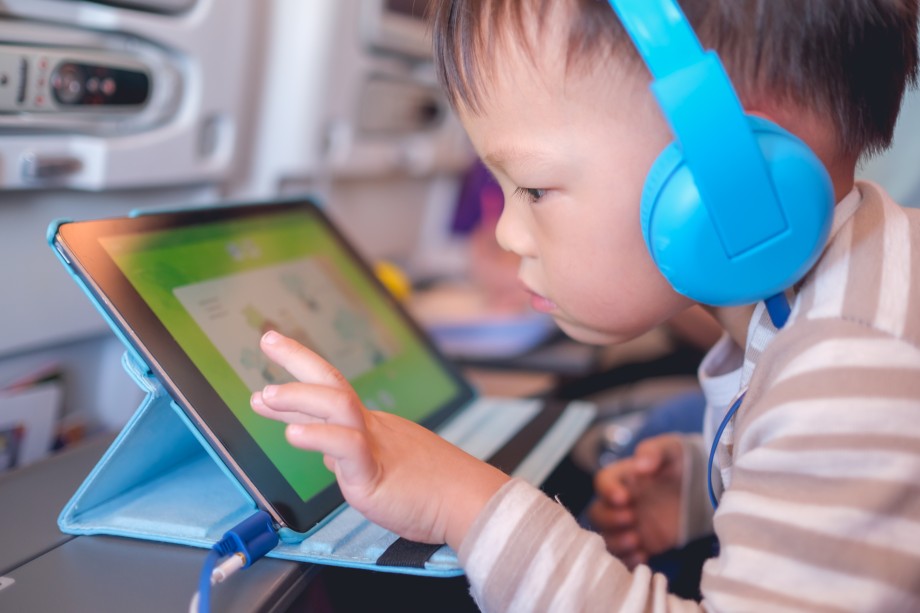A comprehensive meta-analysis of prior research has found, overall, that children ages 1 to 8 were less likely to understand picture books when they read the digital, versus the printed version. However, when digital picture books contain the right enhancements that reinforce the story content, they outperform their print counterparts.

(Photo: GettyImages)
The results are published in Review of Educational Research, a peer-reviewed journal of the American Educational Research Association.
Authors Natalia Kucirkova, Centre for Learning Enviroment at the University of Stavanger, Norway and The Open University, UK, and May Irene Furenes and Adriana G. Bus at the University of Stavanger, analyzed the results of 39 studies that included a total 1,812 children between the ages of 1 and 8. For their analysis, the authors compared children’s story comprehension and vocabulary learning when they read a book on paper versus on screen, and assessed the effects of story-related enhancements in digital books, the presence of a dictionary, and the role of adult support. The bulk of the studies were carried out between 2010 and 2019, and for the greater the part, in the last four years.
Begs the question of which format is better
— The wide availability of digital reading options and the rich tradition of children’s print books beg the question of which reading format is better suited for young readers’ learning, says Kucirkova, a professor of early childhood education and care at the University of Stavanger and The Open University, UK.
— We found that when the print and digital versions of a book are practically the same and differ only in the voice-over or highlighted print as additional features in the digital book, then print outperforms digital, Kucirkova adds.
The authors found that the digital device itself and sometimes digital enhancements that are not aligned with the story content—such as a dictionary—interfere with children’s story comprehension.
Reflecting low quality
When digital enhancements are designed to increase children’s ability to make sense of the narrative—for instance, by prompting children’s background knowledge to understand the story or providing additional explanations of story events—digital books not only outweigh the negative effects of the digital device but also outperform print books on children's story comprehension.
— Our overall findings may reflect the rather low quality of enhancements in the digital books available for young children. Many digitized versions of picture books are inferior to the print version, yet young children widely use them, says Kucirkova.
With a few exceptions, the commercially published digital books in the studies did not include storytelling techniques that adults provide during book sharing, for example attracting children’s attention to the main story elements and focusing their attention on the chain of story events.
— If we want to support all children, we need to understand the impact of digital books and make them of higher quality. Digital books are low-cost to access and thus more readily available to those from disadvantaged backgrounds. Furthermore, we can customize digital books to a child’s level of learning by including interactive features responsive to the child, says Kucirkova.
Some are more likely to be distracted
— For reasons that need to be clarified by additional research, our meta-analysis shows that children from disadvantaged socioeconomic backgrounds are more likely to be distracted from story content on digital books by their interactive features and by the reading devices themselves. As a result, these children are experiencing the most difficulty comprehending digital picture books, says Bus, professor II at the University of Stavanger.
— Makers of children’s digital books need to be careful about the enhancements they make, and educators and parents need to choose carefully which digital books young children read, Internationally, it is important to promote the production of exemplary prototypes including text in a range of languages and provide incentives to publishers, authors, designers, and illustrators to change the status quo, says Kucirkova.
Important to exercise caution
The authors found that digital books may be more effective than print books for enhancing children's vocabulary if the digital books use a dictionary that defines infrequently used words and expressions. However, digital dictionary features hinder children’s ability to understand the story they are reading, indicating that focusing attention on word meanings distracts children’s attention from the story content.
— This is further evidence that digital book designers need to exercise caution with seemingly small and popular additions that may be helpful for isolated outcomes such as vocabulary learning but hinder the reading session overall, Kucirkova says.
Text: Kristin Vestrheim Cranner.
Researchers at University of Stavanger in this article:
Norwegian Centre for Learning Environment and Behavioral Research in Education
Knowledge Centre for Education
National Centre for Reading Education and Research
Maybe you'd like to know more about:
Impact Case: WiKIT: Transforming Children’s Learning with evidence-based EdTech
WiKIT is a social enterprise that was spun off from the University of Stavanger, and was created with the goal to bridge...
Now you can register for the world's largest conference on bullying
Registration is now open for the World Anti-Bullying Forum (WABF), which will take place in Stavanger from June 11-13, 2...
Could scented books encourage more kids to read?
Do you remember the scented erasers you had as a child? ‘Scratch and sniff objects’ have now made a comeback.
Are Sámi schoolchildren more involved in online bullying than other students?
A new research project is going to look into whether Sámi students in Norwegian schools are more involved in online bull...
LIFE - life skills education in Norwegian schools
LIFE wants to achieve a new and improved understanding of life skills education (LSE) in Norwegian schools.
– Parents can play a major role in the work to prevent cyberbullying
A new international research project will determine whether parents can have a more important role to play than previous...
Bringing the world's largest conference on bullying to Norway
The world's largest anti-bullying conference, the World Anti-Bullying Forum, will be held in Stavanger, Norway, in 2025....
Publications from the INTERACT project
Articles from the project. Use the DOI-link to read abstract.
Accompanying the teacher ‘into’ the classroom
In the INTERACT research project, teachers receive guidance from their own specially trained coaches. “I am lucky to be ...
Initiating multisensory reading research collaborations between Turku and Stavanger
In the months of August and September, professor Natalia Kucirkova had the pleasure to visit the University of Turku as ...
A research project to make teaching more engaging
Teacher Olaug Ueland receives feedback on her teaching from a personal coach. The goal is to make interaction with the p...
Video abstracts
In this selection of video abstracts, we provide a glimpse into exciting and important research topics about early child...
PARTICIPATE - Parents and technology in digital bullying
Digital bullying is a big challenge all over the world. The PARTICIPATE project is looking at this research theme in rel...
The importance of parents in the work to prevent cyberbullying
What role do parents have in the prevention of cyberbullying? The international research project PARTICIPATE will seek a...
Teachers bullying children – a global problem
All over the world, children are being bullied by adults in school. New research now shows that these students could als...
Children’s experiences of smells and scents
Odors change as the weather changes. Rain or sunshine, there are interesting smells, both outside and inside, to discove...
Sensory Books team gathering
On the 16th of August, the Sensory Books team held their first group gathering after the summer holidays. It was a momen...
Countries that do well in the PISA assessment have one thing in common
The most common thing about countries that are 'successful' in PISA, is a higher level of gender equality in the populat...
New exhibition sparks children’s story wonder with smells and scents
Smell is an important sense that activates memories and enhances experiences. Yet, smell is often neglected in learning ...





















